1980 – 1999
BLACK: legal events in Oregon | BLUE: legal events in the Oregon State Bar | BROWN: federal events | GREEN: hyperlinks
1980 Derrick Bell, the first Black tenured professor at Harvard Law School, is appointed dean of the University of Oregon School of Law and becomes the first Black dean of a non-historically Black college, serving until 1985. Bell is in the midst of a career marked by strongly principled stands on faculty hiring in American law schools and substantial scholarly work. His early career includes leadership in Mississippi with the NAACP’s Legal Defense and Educational Fund. Of his time in the South Bell observes: “I learned a lot about evasiveness, and how racists could use a system to forestall equality. . . I also learned a lot riding those dusty roads and walking into those sullen hostile courts in Jackson, Mississippi. It just seems that unless something’s pushed, unless you litigate, nothing happens.”
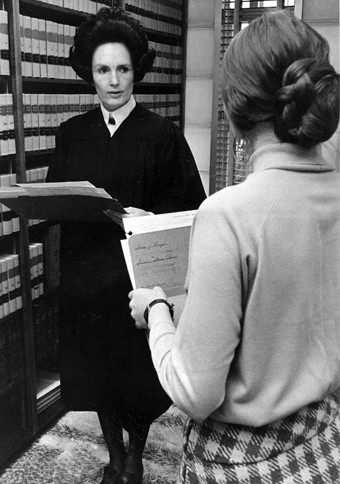
1980 The Honorable Helen Frye, judge of the Lane County Circuit Court, is appointed by President Jimmy Carter to the United States District Court for Oregon, becoming Oregon’s first woman federal court judge.
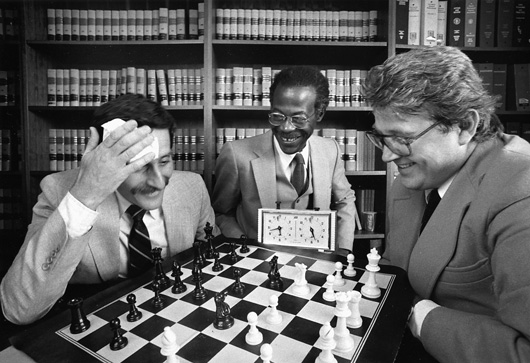
1980 The Association of Oregon Black Lawyers (AOBL) is founded with John Toran as its first president. Succeeding presidents include Ernest Estes, Armonica Gilford, and Cedric Brown. Other founding members are Roosevelt Robinson, John Rodgers, Clifford Freeman, Marcia Neal, Monica Little, Bruce Posey, Ken Dixson, and Jasper Ambers.
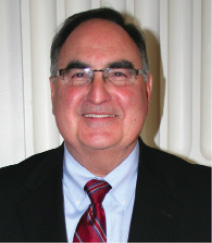
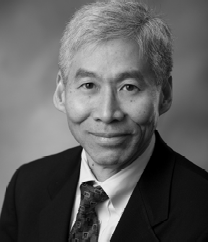
1980 Attorney Paul De Muniz becomes the first Hispanic member of the Oregon State Bar Board of Bar Examiners.
1981 Mark Wada helps establish the law firm of Farleigh Wada Witt and becomes one of the first Asian-American attorneys to be a partner in an Oregon law firm.
1981 Professor Dom Vetri begins teaching a LGBT legal issues course at the University of Oregon School of Law, one of the first such courses in the country.
1981 The State Legislature expands the Oregon State Bar Board of Governors from 12 to 15 members, with the addition of three public members. In the years since, public members have contributed important insights to further the Bar’s mission of protecting the public and improving the administration of justice.
1981 Christie Helmer is elected as the first woman attorney member of the Oregon State Bar’s Board of Governors. She is followed three years later by attorney Ellen Rosenblum.
1982 Wisconsin becomes the first state in the nation to outlaw discrimination on the basis of sexual orientation.
1982 Repudiating the tribal termination policy of the 1950s, Congress begins the passage of legislation restoring federal recognition of Oregon Native American tribes. As of 2014, there are nine federally recognized tribes in Oregon.
1982 The Supreme Court issues Plyler v. Doe, 457 US 202 (1982), a landmark decision holding that states cannot constitutionally deny students a free public education on account of their immigration status. Plyler has ensured equal access to education for children regardless of status, though anti-immigrant sentiment continues to threaten that right.

1982 Jose Mata is appointed administrator of the Oregon State Bar Affirmative Action Program.
1983 Betty Roberts becomes the first female member of the Oregon Supreme Court, by appointment of Governor Victor Atiyeh. Later that year she is elected to a full term on the court.
1983 Concerned with the drop in enrollment of minority students in Oregon law schools, in 1982 the Oregon State Bar forms the Oregon State Bar Minority Scholarship Program to solicit funds from private sources for minority scholarships. Despite the recession of this time, money is found. The same year there are enough minority lawyers to form La Alianza Legal de Oregon (LALO) and the Association of Oregon Black Lawyers, which allow minority law students and attorneys toconfer on immigration issues, legislation and legal resources, and to arrange cultural events and support one another. OSB members Manuel Perez, Ron Knox, and John Toran lead the efforts to create these two organizations.
1984 Attorney Ellen Rosenblum is elected a member of the Oregon State Bar Board of Governors. She goes on to serve as a circuit and court of appeals judge and Oregon Attorney General, as well as secretary of the American Bar Association.
1984 Weisha Mize is appointed administrator of the Oregon State Bar Affirmative Action Program.
1984 There are 110 minority members of the Oregon State Bar, amounting to 1.5 percent of the membership.
1985 The Oregon State Bar establishes policy that prohibits the use of Bar facilities by any organization or group that discriminates “in any way, on the basis of race, gender, religion, nationality or any other invidious distinction.”
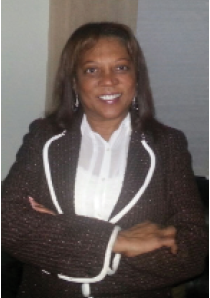
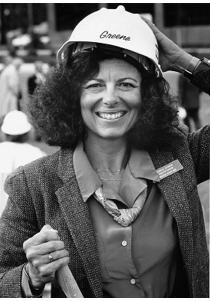
1985 Gordon Osaka becomes the first Asian American to join the Oregon State Bar Board of Bar Examiners.
1985 In another “first” for the Oregon State Bar, the Board of Governors appoints Celene Greene as the first woman executive director. An experienced state bar executive, Greene goes on to lead the bar’s staff for the next 10 years.
1985 Joan Seitz, a Douglas County attorney, becomes the first woman elected to a circuit court bench in southern Oregon, following a door-to-door campaign for the judgeship.
1985 Lee Coleman is selected as the administrator of the Oregon State Bar Affirmative Action Program.
1986 American Bar Association (ABA) adopts Goal IX in its Diversity Plan: To Promote Full and Equal Participation in the Profession by Minorities and Women. The same year the ABA establishes the Commission on Opportunities for Minorities in the Profession, which later becomes the Commission on Racial and Ethnic Diversity in the Profession.
1986 Attorney Rocky Barilla becomes the first elected Hispanic member of the Oregon Legislative Assembly, being elected to the House of Representatives. Attorney Raul Soto- Seelig had previously been appointed to serve an unfinished term in the Oregon Senate, but was not re-elected to the seat.
1987 The ABA creates the Commission on Women in the Profession to assess the status of women in the legal profession and to identify barriers to advancement.
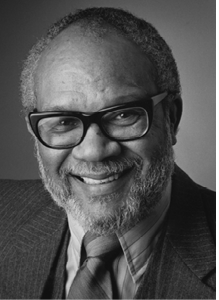
1987 Chalmers Jones is the first Black appointed as a public member of the Oregon State Bar Board of Governors.
1987 Gregory Gudger, a 1986 graduate of Willamette University College of Law, becomes the first Black law clerk of the Oregon Supreme Court.
1988 Oregon Governor Neil Goldschmidt issues an executive order banning discrimination based on sexual orientation in employment in the Executive Branch of state government. The Oregon Citizens Alliance begins an initiative campaign to repeal the order, and gathers enough signatures to place Ballot Measure 8 on the ballot in November 1988. The measure proposes to revoke the executive order and to enact a statute prohibiting any state official in the future from requiring non-discrimination against state employees based on sexual orientation. Oregon voters approve the measure by a 5.5 percent margin. Harriet P. Merrick, a lesbian employee of the University of Oregon, files a lawsuit challenging the new statute, with the assistance of the ACLU of Oregon. In its 1992 decision in Merrick v. Board of Higher Education, 116 Or App 258, 841 P2d 646 (1992), the Oregon Court of Appeals declares the statute unconstitutional because its effect is “to restrain the right of free expression” in violation of Article I, section 8, of the Oregon Constitution.
1988 A 28 year-old Ethiopian student and father, Mulugeta Seraw, is fatally beaten in Portland by three racist skinheads. Seraw’s father and son, represented at no cost by the Southern Poverty Law Center and the Anti-Defamation League, and assisted by Oregon attorney Elden Rosenthal, win a civil case against the White Aryan Resistance’s operator Tom Metzger and his son John Metzger for a total of $12.5 million.
1988 Rebecca Sweetland becomes the administrator of the Oregon State Bar Affirmative Action Program.

1989 Victor Vasquez, Jr., becomes the first Hispanic public member of the Oregon State Bar Board of Governors.
1989 Oregon Women Lawyers (OWLS) is established to promote advancement, equal rights, and opportunities within Oregon and within the legal profession and judicial system for women and minorities, and to improve the quality and image of the legal profession. OWLS is initially led by Katherine O’Neil, who, during her career chairs the Professional Liability Fund and the Oregon Law Foundation boards, is the leader of Oregon’s delegation to the ABA House of Delegates for 11 years, serves on the ABA Board of Governors, and chairs the ABA’s Commission on Disability Rights.
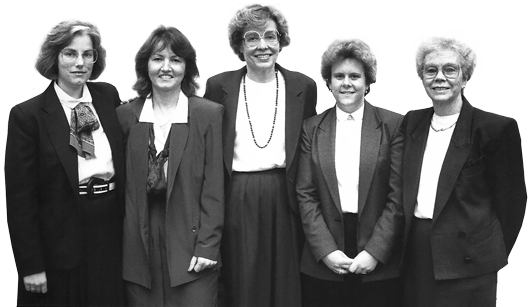
1990 Gayle Patterson becomes the first Black woman attorney to serve on the Oregon State Bar Board of Bar Examiners.
1990 The Native American Tribes located within the State of Oregon have their own tribal justice systems. Tribal courts hear cases and resolve disputes through the application of the laws of their tribe. Each tribe appoints or elects its own judges and each has requirements for attorneys wishing to practice before the tribal court. The jurisdiction and the procedures of each tribal court are unique to the specific tribe.
1990 Ira Zarov, director of Oregon Legal Services, and Louis Savage, director of Multnomah County Legal Aid, both Jewish, organize the Campaign for Equal Justice to raise funds and educate lawyers and the public about access to justice and how legal services are delivered in Oregon. The first executive director of the Campaign for Equal Justice is Linda Clingan, who is Native American.
1990 Ernest Warren and Kenneth Walker establish the first African-American law firm in Oregon, Walker & Warren. In 2007 Kenneth Walker will be appointed a judge on the Multnomah County Circuit Court by Governor Kulongoski.
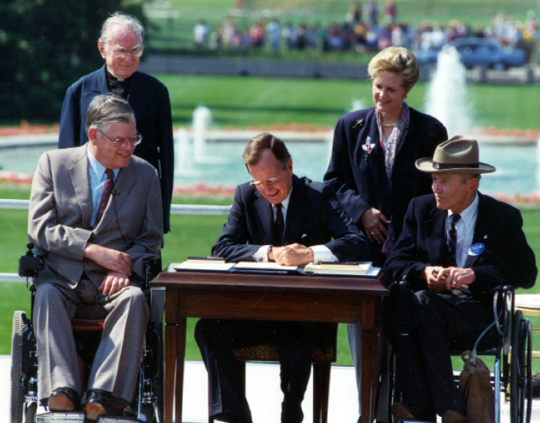
1990 The Americans with Disabilities Act becomes law, providing comprehensive civil rights protection for people with disabilities. Closely modeled after the Civil Rights Act and Section 504, the law is the most sweeping disability rights legislation in American history. It mandates that local, state, and federal governments and programs be accessible, that employers with more than 15 employees make “reasonable accommodations” for workers with disabilities and not discriminate against otherwise qualified workers with disabilities, and that public accommodations and commercial facilities make “reasonable modifications” to ensure access for disabled members of the public, and not discriminate against them. The act also mandates access in public transportation and communication.
1991 The Northwest Indian Bar Association is created with the goal of increasing the number of Native American attorneys in the Pacific Northwest through legal education, scholarship support, mentorships, and advocacy.
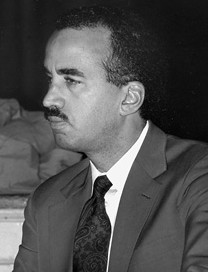
1991 Oregon Gay and Lesbian Lawyers Association (OGALLA) is founded in George Eighmey and Peter Livingston’s living room at the suggestion of Geoff Wren with Mark Johnson and Jamie Ross serving as co-chairs. In 2009 the organization officially changes its name to OGALLA: The LGBT Bar Association of Oregon.
1991 Janice Wilson is appointed to the Multnomah County Circuit Court becoming Oregon’s first openly LGBT judge.
1991 Oregon Minority Lawyers Association (OMLA) is established to help build a welcoming environment for new lawyers of all colors, races, and ethnic backgrounds. OMLA offers scholarships for school and for the bar-exam preparation course, and holds events for fund-raising and fellowship. Lynn Nakamoto (the first Asian American appointed to the state court of appeals) and Jeffrey Millner (the first Black partner at Miller Nash) serve as initial co-chairs of the Association.
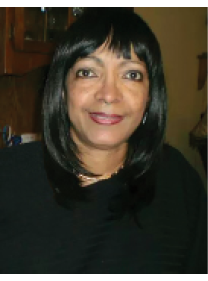
1991 The Oregon State Bar passes a resolution to conduct a “comprehensive assessment by the bar and the courts to determine the incidence of disability and disability concerns among its members, the public, and the justice system.” Ultimately, a joint task force on disability access to state courts is established with three principal objectives: (1) to evaluate the accessibility of Oregon state courts; (2) educate state court judges and court staff about accessibility; and (3) offer recommendations for improving accessibility. The report provides a blueprint for recommendations for addressing accessibility as well as a department within the Bar to continue to advocate for members of the Bar and the public regarding disabilities.
1991 The Oregon State Bar establishes the President’s Affirmative Action Award. Click here for pdf of OSB Affirmative Action Award recipients. Ed Reeves is the first recipient.
1991 Rita Lucas is appointed administrator of the OSB Affirmative Action Program.
1992 The American Bar Association (ABA) creates the Presidential Task Force on Minorities in the Justice System, which later becomes the Coalition on Racial and Ethnic Justice.
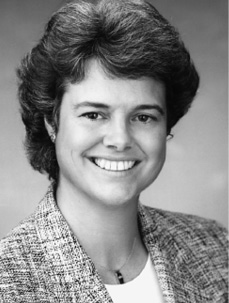
1992 Oregon attorney and state senator Jim Hill is elected Treasurer of Oregon, the first Black elected to statewide office in the state.
1992 The Oregon Supreme Court Task Force on Racial and Ethnic Issues in the Judicial System is formed to study the treatment of racial and ethnic minorities at multiple decision points in Oregon’s criminal justice system. The task force will publish its final report in 1994.
1992 Julie Frantz becomes the first woman president of the Oregon State Bar. As president she improves communications with Bar members and focuses on ethnic representation and access to justice for all Oregonians.
1992 During her one-term tenure, Governor Barbara Roberts, Oregon’s first woman governor, appoints nine women and several racial and ethnic minorities to judicial positions at the state and local levels, significantly increasing the diversity of the Oregon judiciary. Roberts appoints Daniel P. Santos as the Governor’s Legal Counsel, the first Hispanic to serve in that role. Santos will again serve as legal counsel when he is appointed to the position by Governor John Kitzhaber in 2001.
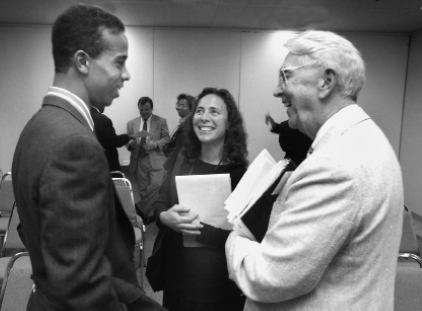
1992 Under Chief Justice Edwin Peterson, the Oregon Supreme Court establishes a Task Force on Racial/Ethnic Issues in the Judicial System, which issues its report in 1994. The report concludes, among other things, that many non-English-speaking minorities appearing in court do not comprehend what is going on because they do not understand the justice system or the language spoken in court; that too few minority lawyers practice in Oregon; and that judges handling family law cases involving minorities often lack an understanding of the traditions and cultural practices of minority families. The task force offers recommendations initiating a decade of reforms within the Oregon legal community. Among its 72 recommendations, nine relate to the Oregon State Bar. By 1997 all but one of them is implemented by the Bar. Following his retirement from the court, Chief Justice Peterson serves as the chair of the Bar’s Diversity Task Force.
1993 Janet Reno is appointed the first woman to serve as the United States Attorney General by President Bill Clinton.
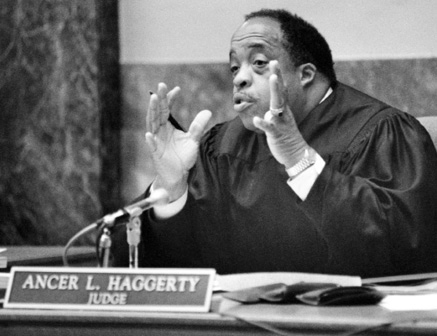
1994 Oregon Circuit Court Judge Ancer Haggerty, a former member of the Oregon State Bar Board of Bar Examiners and the first Black partner in a major Oregon law firm (1977, Schwabe, Williamson and Wyatt), becomes the first Black to be appointed to the United States District Court for the District of Oregon. Judge Haggerty serves as Chief Judge of the Court from 2002 to 2009.
1994 There are 349 minority members of the Oregon State Bar, amounting to 2.9 percent of the membership.
1994 Thomas Nelson, who began practicing law in Oregon in 1978, converts to Islam, becoming the first known Muslim member of the Oregon State Bar.
1994 Protection & Advocacy for Assistive Technology (PAAT) begins in 1994 when Congress funds Oregon Advocacy Center to assist individuals with disabilities in accessing assistive technology and services through case management, legal representation and self-advocacy training.
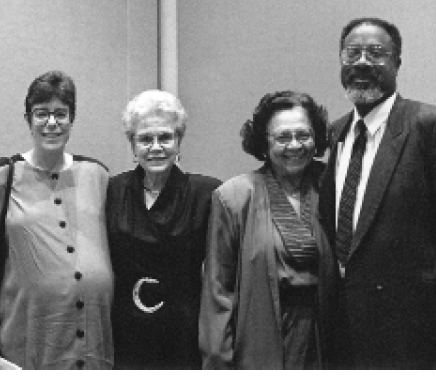
1995 Governor John Kitzhaber signs legislation requiring the testing and certification of interpreters working in the courts. The law emerges from the report issued by the 1992 Task Force on Racial/Ethnic Issues.
1995 Michael Loy, a third-generation Oregonian, is appointed Oregon’s first Asian-American judge when he joins the Multnomah County Circuit Court.
1995 The Indian Law Section of the Oregon State Bar is created with the goal of encouraging a greater understanding and improvement of the practice of Indian law throughout Oregon.
1995 The Bill and Ann Shepherd Legal Scholarship Fund of Equity Foundation is established to provide financial assistance to third-year and fourth-year law students who wish to advance equal rights and justice for lesbians, gays, bisexuals, and transgender individuals.
1995 Oregon Interpreter Code of Professional Responsibility is signed by the Chief Justice of the Oregon Supreme Court.
1995 Governor Kitzhaber appoints Henry “Chip” Lazenby as his general counsel, making Lazenby the first Black to be appointed as a gubernatorial general counsel. Lazenby organizes the government-to-government process as well as negotiates the gaming compacts with Oregon’s tribes, effectively shaping this growing industry.
1995 Roberta Cooper Ramo is elected the first woman President of the American Bar Association.
1996 In Romer v. Evans, 517 US 620 (1996), the U.S. Supreme Court strikes down Colorado’s Amendment 2, which denied gay men and lesbians protections against discrimination. According to Justice Anthony Kennedy, “We find nothing special in the protections Amendment 2 withholds. These protections…constitute ordinary civil life in a free society.”
1996 The Defense of Marriage Act (DOMA) is signed into law allowing states to refuse to recognize same-sex marriages granted under the laws of other states. DOMA bars same-sex married couples from being recognized as “spouses,” codifying non-recognition of same-sex marriages for all federal purposes, including insurance benefits for government employees, Social Security survivors’ benefits, immigration, bankruptcy, and the filing of joint tax returns, as well as excluding same-sex spouses from the scope of laws protecting families of federal officers, laws evaluating financial aid eligibility, and federal ethics laws applicable to opposite-sex spouses. In United States v. Windsor, 570 US _ (2013), the U.S. Supreme Court declares Section 3 of DOMA unconstitutional under the Due Process Clause of the Fifth Amendment.
1996 Governor Kitzhaber issues Executive Order 96-06 establishing government-to-government relationships with Oregon’s nine federally recognized tribes. These government-to-government relationships will be codified into Oregon law with the passage of Senate Bill 770 in 2001.
1997 The Association of Oregon Black Lawyers (AOBL) transitions to the Oregon Chapter of the National Bar Association with Clarence Belnavis as president. Other officers include Ulanda Watkins as vice president, Reginald Nettles as treasurer, and Melvin Oden-Orr as secretary. The National Bar Association is an organization established in 1925 by Black lawyers during the time the American Bar Association would not admit African-American members.
1997 A report issued in August 1997—Affirmative Action Predicate Study, Examining Minority Participation in the Oregon Legal Profession—provides both hope and concern for those interested in diversifying membership within the Oregon State Bar. The findings include evidence that minorities were at a disadvantage compared to Whites in such ways as “having fewer personal contacts with lawyers prior to entering law school” and “having fewer friends in law school outside of the minority community.” Regarding law school and the bar exam, “the survey results make it clear that African-American attorneys feel more isolated in law school and more alienated from the dominant legal profession than other minorities do.” The most positive conclusion is that “within the legal profession and the State Bar, [there is] little evidence that minority attorneys experience discrimination or direct negative treatment. Most minority attorneys express appreciation for the efforts of the OSB and its Affirmative Action program to improve participation and diversity in the legal profession.”
1998 Oregon State Bar Board of Governors authorizes a study to determine the experiences of minority lawyers in large law firms and organizes a Diversity Summit to bring together “the leadership of bar organizations in the state whose mission includes diversifying the bar and law school communities.”
1998 Mark Johnson becomes the first openly LGBT president of the Oregon State Bar as well as the first openly LGBT president of any state bar association.
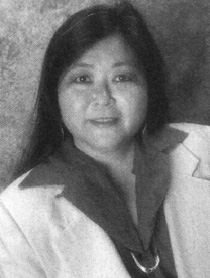
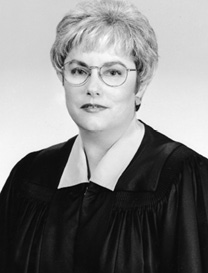
1998 The Oregon State Bar’s Affirmative Action Program establishes Opportunities for Law in Oregon (OLIO), an ABA-recognized program to further its minority recruiting and retention efforts. Its main thrust is an orientation for racial and ethnic minority students entering their first year of law school in which upper-level law students, practitioners, and judges mentor new students. OLIO’s efforts to recruit and retain students are expanded under Stella Manabe, the ninth administrator of the Oregon State Bar’s Affirmative Action Program.
1998 Darleen Ortega becomes the first Latina partner at a major Oregon law firm, Davis Wright Tremaine.
1998 Oregon Supreme Court Justice Susan Graber becomes the first woman from Oregon to be appointed to the United States Court of Appeals for the Ninth Circuit.
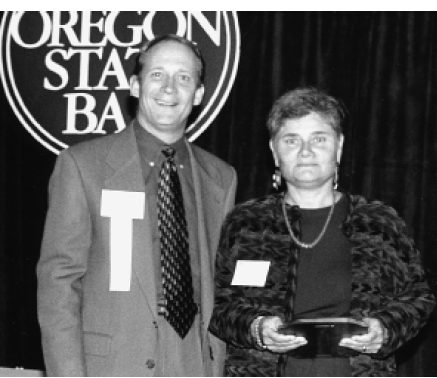
1998 The Oregon State Bar, the Campaign for Equal Justice, and the Oregon Law Foundation sponsor an Access to Justice Conference, entitled “Partnership for Justice.” Participants examine issues of, and propose remedies for, access to justice, resulting in a Consortium for Access, an effort to implement the recommendations.
